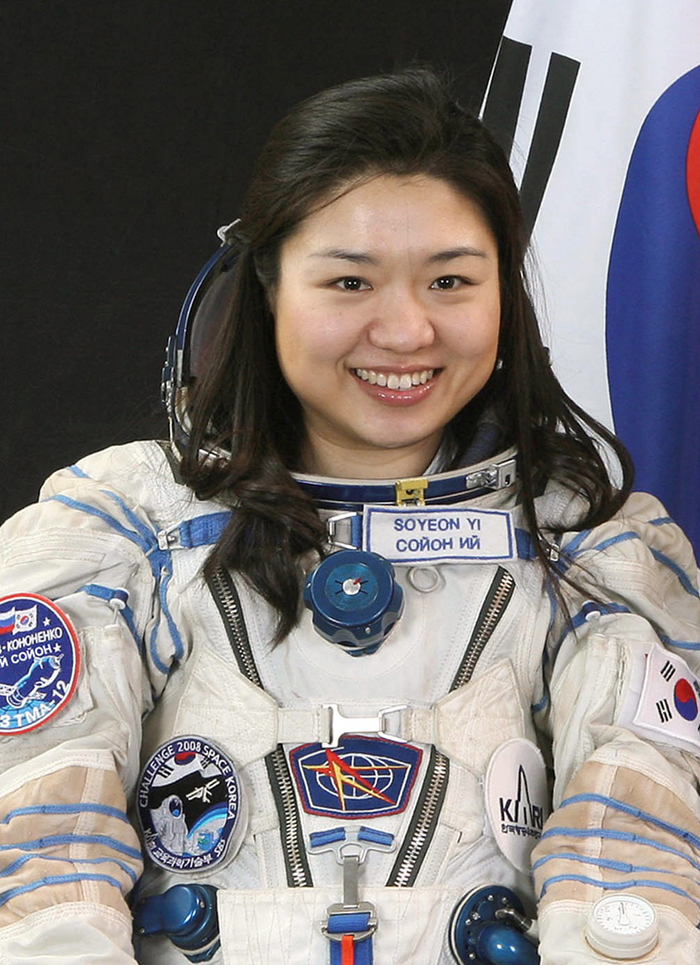Editor’s note: This is part 2 of the voyage of Soyeon Yi, the first South Korean in space.
Read part 1 — The first Korean to fly in space calls Puyallup home
By Janice Nesamani
Northwest Asian Weekly

Soyeon Yi
A star is born
It was during her last year at the Korea Advanced Institute of Science and Technology (KAIST) that the space bug bit Soyeon Yi. “My motivation was never to become South Korea’s first astronaut. I wanted to conduct experiments in space. As an engineer, once you create something, you test it in different environments, under high pressure and temperatures. I would always wonder how something I made would work at home or on the equator or in Antarctica. So to test something in space was a dream come true.”
Yi happened to see an advertisement in the newspaper announcing the possibility of the Korean government starting its own space program to send its first astronaut into space.
Soyeon applied and was picked from 36,000 candidates.
The candidates had to undergo several elimination rounds, which were televised much like a reality show. The South Korean government wanted a huge campaign to inspire the young generation and the general public. They opened the door as wide as possible. The criteria? You had to be a Korean citizen, over 19 years old, and believed you were healthy enough to go into space.
“When I reached the top 30 candidates, the organizers called me up to say that they were making the participants’ names and faces public. So, I told my parents and my adviser about it. My mother knew if she said no, it would drive me to pursue the program more zealously. She advised me to complete my PhD first.
Once Yi made it to the Top 10, things changed. “Everybody wanted me to win. Now, my professor was very happy with my success because every time I was in the news, it reflected well on my school, the lab, and him,” she said.
A new environment
In the final round of the televised competition, Yi learned she had to go to Russia. “That was hard and a huge culture shock. I had never been to Russia. I’m glad I went there because I aced the tests put forth by Russian instructors and made it to the final two,” she said.
Now, Yi has only the fondest memories from Russia. She recounts feeling invisible in the beginning, but once she began training, it changed. “My colleagues became my brothers and sisters. My instructors became my parents and the older astronauts were like grandparents. In the winter, they would tell me to bundle up and asked me to eat more because they thought I was starving! Whenever they met me, they asked when I would get married or told me that they wanted to see grandkids soon! They were like family.”
The launch
After a year of training, Yi was launched into space aboard the Soyuz TMA-12 on April 8, 2008. “In one word, it was awesome! Every kid who reads about Tinkerbell or Peter Pan or watched Superman, Wonder Woman, or Never-Ending Story dreams about flying.
When we grow older, we forget about those dreams and when kids remind us of them, we laugh it off. Then, when you are out in space and floating in microgravity, you are flying,” she said.
Yi never tired of looking out of a window at the earth. She said, “It’s like looking at the earth on Google Earth or the NASA website, but it’s alive, it’s real. It’s not a picture anymore!”
The International Space Station (ISS) that she was on rotated around the earth every 90 minutes. So she would have to wait to pass over Korea. “Looking at my home, I realized how small it was, compared to Russia or the United States. I was in awe thinking about how I was from a tiny village on this tiny dot in the ocean and I was chosen to go into space. I felt choked up and my eyes filled with tears.”
“As an engineer, I was amazed at how low the probability was for me to be born in South Korea, and could benefit from the education system and space program. When I went to college, I had to write an essay and apply to be admitted. But to be born among the top 20 countries in the world was like getting admission to an Ivy League university without applying for it.”
Yi came back from space a hero! “I worked with the space agency for six years after returning from space as a science ambassador. I attended and organized a lot of science fairs, events, and space camps. I traveled around universities as an inspirational speaker and sometimes went to companies to motivate employees.” When asked if she felt disconnected from her passion of working in the lab, Yi said she did, but felt it was necessary to encourage awareness of science and technology at the time. “In 2012, I decided to pursue an MBA at UC Berkeley. I felt it would be a great way to bridge the gap between science and finance. As a scientist myself, I know the intricacies of working in the lab and understand how important funding is. Not a lot of scientists are good with money, but they need it to do their research. Someone with a pure financial background may not effectively understand scientists. I wanted to be the middleman.”
Once in Berkeley, Yi had planned to return to Korea, but then cupid struck. She met her husband and followed her heart to Puyallup, where she is now looking for a full-time career. “I made it in Korea because I was there for 30 years. I’ve been in Washington for two years now, I need more time, but I believe I can make it here, too.”
Janice can be reached at info@nwasianweekly.com.



